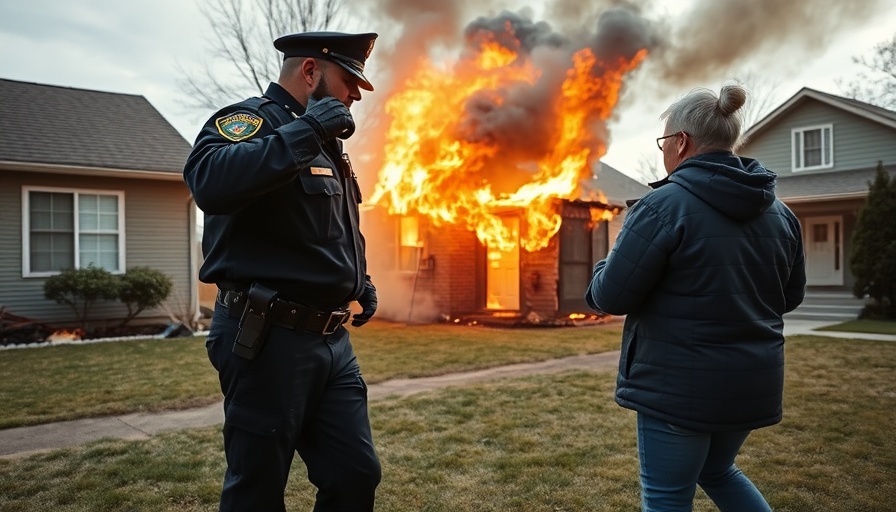
Unusual Incidents in Law Enforcement: A Recent Case from Florida
In a bizarre turn of events, a man in Marion County, Florida, found himself in the headlines after a series of odd behaviors led to his arrest. This incident, which video footage captures, illustrates the unpredictable nature of police encounters and the challenges law enforcement officers often face in the field.
The Incident: What Happened?
On July 8, a deputy from the Marion County Sheriff's office stopped to check on an individual identified as Caldwell, who was acting suspiciously. As the deputy approached, Caldwell unexpectedly fired a flare gun toward the patrol vehicle, prompting immediate concern over safety.
“He just shot a flare gun at me,” the deputy communicated over the radio. The situation escalated further as Caldwell walked away from the deputy, ignoring commands, and exhibited even more erratic behavior by removing his pants and throwing money at the officer. Eventually, he was subdued using a TASER. Fortunately, there were no injuries reported during this tumultuous encounter, but the incident raises several questions about public safety and the mental health of offenders.
Understanding the Context: What Drives Such Behavior?
Instances like Caldwell's are not isolated; they point to larger issues affecting police departments nationwide. For law enforcement, navigating encounters with individuals exhibiting erratic behavior often requires a blending of tactics—from community engagement to strategic use of technology.
With roughly 1 in 5 Americans experiencing mental health conditions, police officers frequently serve as the first responders in situations that may require psychological assessment and intervention. The troubling factors behind such behaviors can include substance abuse, mental illness, or socio-economic stressors. This reality highlights the importance of integrating mental health resources within law enforcement training.
Implications for Officer Safety and Training
As highlighted by this incident, police officers often face unpredictable scenarios that can escalate quickly. Training programs focused on de-escalation techniques, particularly in the context of mental health awareness, are essential for ensuring both community and officer safety. These programs can empower officers to assess situations judiciously, determining the best course of action that prioritizes de-escalation over confrontation.
A key takeaway here is that enhancing training regarding mental health responses needs to be prioritized by police departments to equip officers with tools to handle such unusual incidents tactfully.
Future Predictions: What Does This Mean for Law Enforcement?
As we look to the future, incidents like Caldwell's underscore the necessity for proactive approaches in law enforcement. Departments should consider the integration of advanced training programs that not only focus on physical engagement but also emphasize psychological insights. The inclusion of technology, such as body-worn cameras, plays an essential role in maintaining transparency and accountability during such encounters.
Moreover, ongoing community relations initiatives can foster a more cooperative environment where individuals feel safe and valued, ultimately reducing the likelihood of distressing incidents.
The Bigger Picture: Community and Law Enforcement Relations
The interaction between Caldwell and the sheriff's deputy signals broader themes in police-community relations and public safety governance. Restoring community trust in law enforcement through transparent practices encourage collaboration and support. Engaging in dialogues with community members about mental health and substance use resources can help position police as allies rather than adversaries.
Transparency and accountability in policing are now more critical than ever. Law enforcement agencies must develop robust frameworks for scrutinizing incidents where officers interact with individuals in crisis, learning from them to implement new training protocols and community engagement strategies.
Take Action: The Importance of Police Reform
As news like Caldwell’s spreads, it's paramount for citizens to advocate for comprehensive police reforms prioritizing officer wellness, community relations, and mental health awareness. Addressing the systemic challenges faced by today’s law enforcement will not only enhance operational efficiency but can also contribute to better outcomes for individuals experiencing crises. Community involvement and support for ongoing training efforts serve as catalysts for sustainable change.
For police departments, continuous investment in training, technology, and community relations is integral to fostering a safe environment for both officers and the public. Gathering insights from incidents like this not only provides learning opportunities but also enhances the overall effectiveness and perception of law enforcement in our communities.
 Add Row
Add Row  Add
Add 

 Add Element
Add Element 


Write A Comment